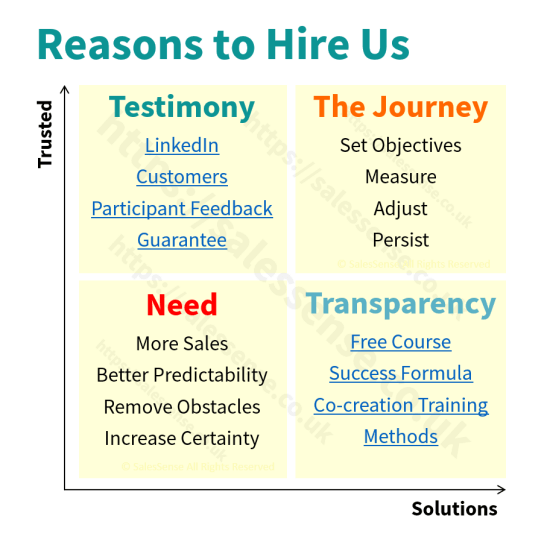Grow business from established customers with a sales account management training course.

Strengthen customer relationships, reduce customer churn, and increase repeat business with an account management training course. Take this ten-session course to renew sales momentum and business success with established customers.
What is the best account management training?
- Having immediate access to best practice based guidance. See the detailed list below.
- Studying or reviewing the content in advance and then spending session time creating implementation plans and practising execution.
- Interactive sessions based on practical, real-world exercises.
- Training that facilitates the creation of a consistent process.
- The co-creation of workplace actions for embedding learning in participant routines and habits.
- The opportunity for one-to-one learning.
- Course facilitation by the author.
- A performance guarantee.
Maintain or develop stronger longer longer-lasting ties with important customers.
Training Objectives
- Develop a reliable account management process.
- Understand the customer's business.
- Articulate business-level contribution.
- Extend access to senior people.
- Achieve trusted advisor status.
- Establish strategic value.
- Develop account plans.
Typical Training Outcomes:
- Improved customer satisfaction.
- Increased sales and revenue.
- Enhanced skills and knowledge of account managers.
- Better client retention and loyalty.
- Improved communication and collaboration.
- Increased efficiency and productivity.
- Better alignment of sales and customer objectives.
- Increased cross-selling and upselling opportunities.
Course Content
Introduction: Goals, objectives, and learning management.
Business Knowledge: Understanding the Customer's Perspective.
Thinking Like a CXO: Inside the minds of senior executives.
Supplier Standing: How to measure and improve perceptions.
Strategic Partnership: How to become more than a supplier.
Trusted Advisor: How to know if you are one and how to become one if you are not.
Cross Selling: How to expand customer relationships in large organisations.
Business Reviews: How to establish regular involvement.
Buying Participation: How to become part of the customer's buying team.
Review and Next Steps: How to transform learning into results.
This account management training course provides new tools and methods for assessing customer potential, evaluating relationship status, and demonstrating value. Learn new skills for developing and strengthening relationships, expanding presence, and increasing strategic significance.
Who Should Attend
Salespeople and account managers who are tasked with maintaining and developing business through existing customers. Participants learn how to position themselves and their company, centre stage by establishing senior-level relationships and expanding presence across departments.
Additional Benefits
- Flexible multi-session 'learning by doing' structured training course.
- Workplace assignments develop new habits and practices.
- Tools, templates, frameworks, and examples save time and aid learning.
- Common language improves communication and teamwork.
- Promotes adoption of best practice habits and methods.
- Increases sales productivity, consistency, and results.
- Improves job satisfaction and motivation.
- Reduces staff turnover.
Training Course Delivery Options
- One-to-One
- Take the course through ten 1-hour or five 2-hour one-to-one sessions with the course author.
- £995 - Learn more.
- One-to-one on a per-session basis.
- £150 - Learn more.
- Virtual Classroom Group Training
- Ten 1-hour or five 2-hour virtual classroom sessions.
- £3995 for up to fifteen people. Learn more.
- Progress through the content session by session in any order. Schedule each session to suit participant needs.
- £450 per 1-hour session for up to fifteen people. Learn more.
- Fees exclude applicable VAT.
- Traditional Classroom - The programme delivery takes place over one or more days at a conference venue or the customer's offices. Contact us for fees.
Use this link for more information or to have us call you.
What are the best practices for B2B sales account management?
Best practices in B2B sales account management focus on building strong, long-lasting relationships and maximising the value of each account. The goal is to become a trusted partner to your customers, helping them succeed while also growing revenue for your organisation. Here are key best practices for effective B2B sales account management:
1. Develop a Deep Understanding of the Customer
Research and Know the Business: Understand your customer’s business model, industry trends, pain points, and strategic goals. Stay informed about their organisational changes, new product launches, and market shifts.
Map the Customer’s Organisation: Identify key decision-makers, influencers, and stakeholders within the organisation. Know their roles, responsibilities, and interests.
Understand Their Buying Journey: Analyse their decision-making process, procurement cycles, and typical objections to tailor your approach accordingly.
2. Build Strong, Personal Relationships
Establish Trust: Regularly communicate and provide valuable insights. Be proactive and transparent, ensuring you are seen as a reliable and knowledgeable partner.
Regular Touchpoints: Maintain consistent engagement through check-in meetings, QBRs (Quarterly Business Reviews), and informal conversations. Aim for value-driven interactions rather than just transactional ones.
Tailored Communication: Adapt your communication style to fit the preferences of each stakeholder and keep content relevant to their business challenges.
3. Create a Strategic Account Plan
Set SMART Goals: Define Specific, Measurable, Achievable, Relevant, and Time-bound goals for each account, covering both short-term and long-term objectives.
Account Segmentation: Segment your accounts based on potential value, size, and strategic importance to allocate resources more effectively.
Identify Growth Opportunities: Regularly assess opportunities for cross-selling, up-selling, and expansion. Look for gaps in the customer’s current solutions and present how your offerings can address them.
4. Provide Proactive Solutions and Insights
Industry Expertise: Share insights into industry trends, emerging technologies, and best practices. This demonstrates thought leadership and adds value beyond your product.
Anticipate Needs: Proactively identify potential challenges your client might face and offer solutions before they ask. Position yourself as a problem solver, not just a vendor.
Benchmark and Measure Value: Show how your solution impacts their business by providing tangible results such as ROI reports, case studies, or comparative benchmarks.
5. Leverage Technology and Data Analytics
Use CRM Effectively: Utilise Customer Relationship Management (CRM) tools to track interactions, opportunities, and customer health. CRMs like Salesforce or HubSpot help maintain visibility and ensure you stay on top of every account.
Analyse Customer Behaviour: Use data analytics to monitor buying patterns, product usage, and customer satisfaction scores. This will help predict churn risks and identify growth opportunities.
Adopt Sales Enablement Tools: Use tools for content management, performance tracking, and automated outreach to streamline the account management process.
6. Collaborate Cross-Functionally
Partner with Internal Teams: Work closely with marketing, product development, customer success, and support teams to deliver a holistic experience for your customers.
Bring in Subject Matter Experts: When appropriate, involve technical or subject matter experts to address specific challenges and add more value to your discussions.
Align with Customer Success: Coordinate with the customer success team to ensure a seamless onboarding process, track usage, and respond to any emerging needs.
7. Implement a Robust Customer Success Strategy
Conduct Regular Business Reviews: Schedule formal QBRs to discuss account performance, review business outcomes, and strategise for the upcoming quarters.
Monitor Customer Health: Track metrics like customer satisfaction (CSAT), Net Promoter Score (NPS), and customer engagement to gauge the health of the relationship.
Create a Feedback Loop: Regularly gather and act on feedback from customers to improve your offerings and strengthen the relationship.
8. Drive Adoption and Engagement
Ensure Effective Onboarding: Set customers up for success from day one by providing comprehensive onboarding and training tailored to their specific needs.
Showcase Wins and Milestones: Celebrate and share successes, big and small, to keep engagement high and showcase the value of your partnership.
Encourage Product Usage: Offer guidance on best practices, new features, and use cases to increase product adoption and satisfaction.
9. Manage Conflicts and Issues with Professionalism
Seek to Understand: Use empathy and active listening to fully understand the client’s perspective before proposing solutions.
Be a Proactive Communicator: Address issues quickly and transparently, providing actionable solutions. Never let a minor issue escalate without your knowledge.
Document Resolutions: Keep a record of complaints, resolutions, and learnings to improve future interactions and prevent similar issues from recurring.
10. Measure and Optimise Performance
Set Key Performance Indicators (KPIs): Track metrics such as account growth, retention rate, churn rate, and overall customer satisfaction to measure success.
Review and Adjust Plans: Regularly review your account plans and strategies, adjusting based on performance and changing customer needs.
Conduct Internal Reviews: Regularly review your accounts with your team or manager to gain fresh perspectives and ensure alignment on key strategies.
By implementing these best practices, B2B sales account managers can strengthen client relationships, identify growth opportunities, and maximise value for both the client and the organisation.
For Large Numbers of Participants
Licensing and train-the-trainer options enable the self-delivery of our sales account management training course. To find out more, call or use the links below.
Delivery by Third-Parties
Associate and Affiliate representation is welcomed. To promote or deliver this course, get in touch directly.
Bespoke Solutions
If you are looking for a sales account management training course or need to strengthen customer relationships and increase business from established customers, get in touch. Telephone +44 (0)1392 851500. We will be pleased to learn about your needs and discuss some options. Alternatively, email custserv@salessense.co.uk or use the contact form here.





















